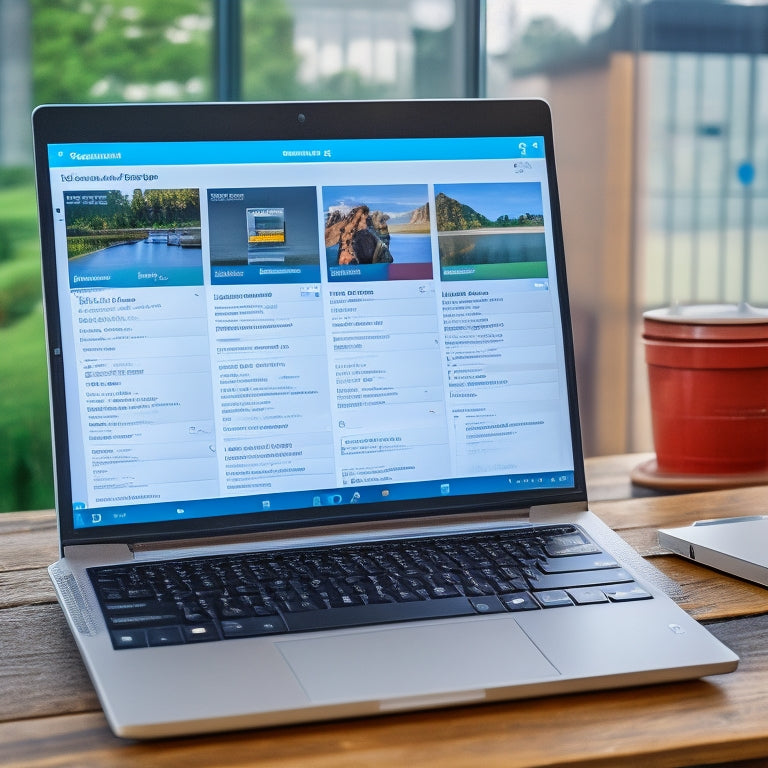
Efficiently Download Files From Sharepoint: Simple Steps
Share
You can efficiently download files from SharePoint by exploring the platform's unique file organization system and leveraging its built-in features. First, master exploration and file organization systems to efficiently find and access files. Next, use the checkboxes, Shift key, and Ctrl key to select files for download. Then, use the Download option to retrieve multiple files in a compressed .zip format. Create a dedicated folder for downloaded files and name them descriptively with dates and version numbers. By following these simple steps, you'll be well on your way to downloading files from SharePoint like a pro - and there's more to explore to maximize your productivity.
Key Takeaways
• Use checkboxes to select files, utilizing Shift and Ctrl keys for range and individual selection, and the Select All option for bulk selection.
• Download multiple files at once using the Download option, which retrieves files in a compressed .zip format.
• Organize downloaded files into folders or libraries with clear naming conventions, including dates and version numbers.
• Verify downloaded files for integrity and completeness, and consider using third-party tools for faster downloads.
• Utilize SharePoint's version control feature to track downloaded files and versions, ensuring easy access and management.
Understanding SharePoint Basics
Your SharePoint experience begins with understanding its core features and capabilities, which include version control, document management, communication tools, and advanced search functions.
To effectively utilize SharePoint, you need to master its navigation and file organization systems. SharePoint navigation involves understanding the site's architecture, including libraries, lists, and folders. You should be able to navigate through these components to find and access the files you need.
File organization is also critical, as it helps you to categorize and structure your files in a logical and coherent manner. By understanding these fundamental concepts, you'll be able to efficiently download files from SharePoint and make the most out of its features.
Selecting Files for Download
To select files for download, navigate to the library or list containing the desired files, and hover over the leftmost column to reveal the checkboxes. Check the boxes next to the files you want to download.
Here are some file selection tips to maximize efficiency:
- Use the Shift key to select a range of files
- Use the Ctrl key to select individual files
- Use the Select All option to select all files at once
- Use advanced selection methods like filtering and sorting to narrow down your selection
- Selecting multiple files at once saves time and reduces the number of downloads
Downloading Files Efficiently
When downloading files from SharePoint, you can streamline the process by using the Download option in the toolbar, which allows you to retrieve multiple files at once in a compressed .zip file. This facilitates quick downloads, saving you time and effort.
To secure file organization, consider creating a dedicated folder for your downloaded files, and name them descriptively with dates and version numbers. This aids in keeping track of downloaded files and versions.
By retrieving multiple files at once, you can also maintain the original file structure, making it easier to locate specific files.
Best Downloading Practices
By adopting a few best practices, you can further optimize the file downloading process from SharePoint, making sure that your files are organized, up-to-date, and easily accessible.
To maximize efficiency, follow these guidelines:
-
Organize files into folders or libraries for easy access and retrieval.
-
Use the Open with Explorer feature for bulk downloading and efficient file management.
-
Avoid downloading large files and opt for a selective approach to reduce download time.
-
Make use of third-party tools for faster downloads and batch processing.
-
Test and verify downloaded files for integrity and completeness to guarantee data accuracy.
Managing Downloaded Files
You'll need to create a folder to organize your downloaded files, ensuring they're easily accessible and retrievable for future use. This is essential for effective file organization and version control. Here's a breakdown of best practices for managing your downloaded files:
| File Management | Best Practices |
|---|---|
| File Organization | Create a folder with clear naming conventions |
| File Naming | Use descriptive names with dates and version numbers |
| File Compatibility | Check file formats for compatibility |
| Version Control | Utilize SharePoint's version control feature |
| File Tracking | Keep track of downloaded files and versions |
Frequently Asked Questions
Can I Download Files From Sharepoint to an External Hard Drive?
You imagine effortlessly transferring files from SharePoint to your external hard drive, ensuring compatibility and best data transfer speeds. Yes, you can do just that, and even add an extra layer of security with encryption options and savvy file organization strategies.
Are There Any File Size Limits for Downloading From Sharepoint?
When downloading from SharePoint, you'll encounter file size restrictions, typically 2GB for individual files and 15GB for zip files. To optimize download speed, consider using third-party tools or SharePoint's Open with Explorer feature for bulk downloads.
Can I Pause or Resume a File Download From Sharepoint?
You can't pause or resume a file download from SharePoint directly, but using a download manager with pause/resume functionality can help mitigate bandwidth usage and network interruptions, ensuring a seamless experience.
How Do I Download Files From Sharepoint on a Mobile Device?
You're part of the 200+ million Office 365 users globally! To download files from SharePoint on a mobile device, use the SharePoint app for offline access, organize files by folders, prioritize speed with smaller files, and guarantee security measures like two-factor authentication.
Is It Possible to Download Files From Sharepoint Using a Command Prompt?
You can download files from SharePoint using the Command Prompt by leveraging the SharePoint REST API and PowerShell scripts, enabling batch downloading and remote access to your files.
Related Posts
-

Mastering Small Closet Organization: Proven Strategies Unlocked
You're about to reveal the secret to transforming your small closet into a functional haven, where every item has its...
